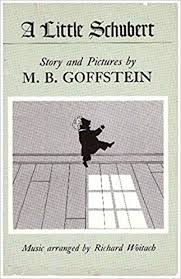Franz Schubert
Listen to the Recess! Clip
| Author | John Cech |
| Air Date | 1/31/2002 |

Franz Schubert Transcript
Brief sound clip
You’re hearing a little from Franz Schubert’s “Noble Waltz” No. 4. The reason the recording is so grainy is because it’s a thin, small vinyl disc that was included in a pocket inside the back cover of a small, square picture book for children called A Little Schubert by M. B. Goffstein. The book was published in 1972 and is long out of print, but it offered just enough of this Austrian composer’s dancing rhythms to make Ms. Goffstein’s point about the use Schubert himself put them to. He was so poor at times during his life that he danced to his music to keep warm in the rooms he lived in but couldn’t afford to heat.
Schubert was born in Vienna on January 31, 1797, the youngest son of a humble, struggling schoolmaster. He learned basic violin from his father, piano from his brother Ignaz, and he was quickly playing better than both of them. His father wanted to nurture his son’s musical gifts and arranged for Franz to take some advanced lessons with the parish church organist, Herr Holzer, who had this to say about young pupil: “If I wished to instruct him in anything fresh, he already knew it. Consequently I gave him no actual instruction but merely conversed with him and watched him with silent astonishment.” Evidently, so did lots of others. By the time he was eleven, he was a choirboy in the Imperial Court Chapel, where he eventually became the student of Salieri — the famous (or as Amadeus would have it, the infamous) rival of Mozart. Schubert began composing in earnest before he reached his teens, though he couldn’t afford the manuscript paper. In one year, when he was eighteen, he wrote — along with four sonatas, five operas, and one hundred and forty-six songs — two symphonies and two masses. He was spared from military service because he was too short (under five feet) and had poor eyesight (he never took off his glasses, it was said, even when he slept). He died when he was thirty-one — obscure, nearly penniless, his huge out-pouring of music barely recognized, still dancing to the tune of his own drummer.